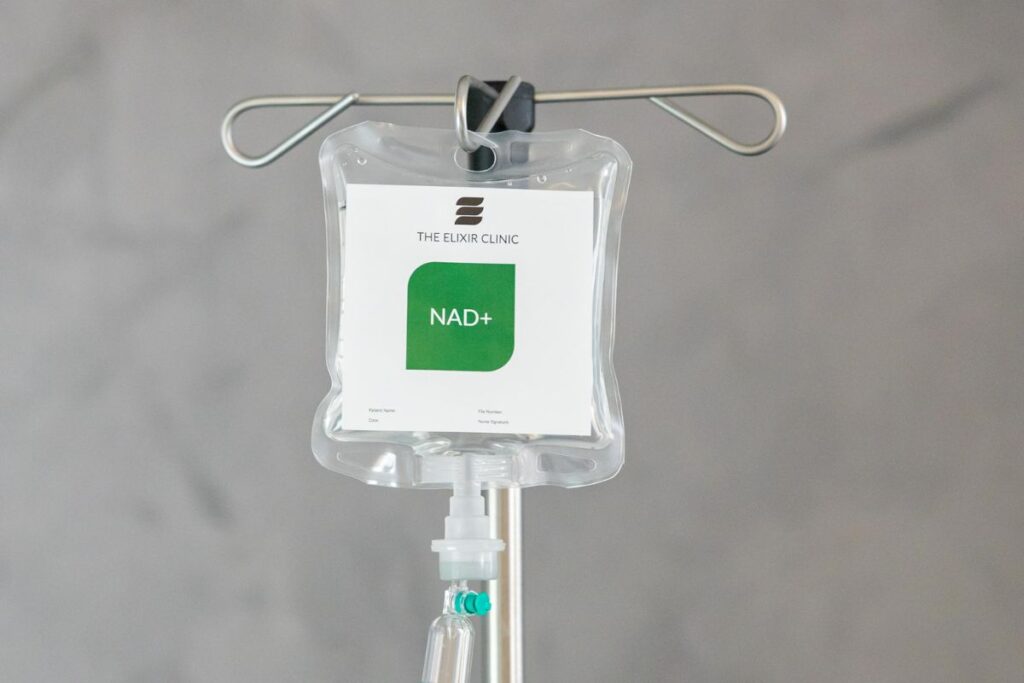As science continues to explore the molecular mechanisms of aging, one compound stands out for its critical role in cellular health and longevity: Nicotinamide Adenine Dinucleotide (NAD+). NAD+ and related molecules such as NADPH are essential cofactors for cellular redox reactions, metabolism, and DNA repair.
In this article, we explore the science behind NAD+, its relevance in metabolic and cellular function, and why supporting healthy NAD+ levels could be a promising therapeutic strategy in age-related decline.

What Is Nicotinamide Adenine Dinucleotide (NAD+)?
NAD+ is a coenzyme found in all living cells, consisting of two nucleotides: one with an adenine base and the other with nicotinamide. NAD+ plays a key role in redox reactions, acting as an electron carrier in cellular metabolism and energy production, particularly within the mitochondria.
NAD exists in two forms: the oxidized form (NAD+) and the reduced form (NADH). The reduced form, NADH, is an electron-rich species that acts as an electron donor in redox reactions, highlighting the importance of reduced forms in mediating enzymatic processes. Both forms are central to metabolic pathways, including fatty acids and amino acid metabolism, and are required by hundreds of NAD-dependent enzymes in human health.
NAD+ and Cellular Metabolism and Health
NAD+ is indispensable for maintaining metabolic homeostasis and supporting key cellular functions. It is crucial for:
• DNA repair via Poly (ADP-ribose) polymerase (PARP)
• Sirtuin activation to regulate gene expression
• Supporting insulin secretion and blood pressure control
• Enhancing mitochondrial biogenesis
• Reducing reactive oxygen species and hydrogen peroxide damage
The body’s ability to produce NAD+ declines with age, leading to mitochondrial dysfunction, cell death, and increased vulnerability to neurodegenerative diseases, metabolic disorders, and stress responses.
NAD Metabolism and Biological Roles
NAD metabolism is fundamental to a wide array of biological processes that sustain life and health. As an essential cofactor, nicotinamide adenine dinucleotide (NAD+) is at the heart of energy metabolism, facilitating the transfer of electrons in metabolic reactions that power our cells.
In mammalian cells, NAD+ is produced through both the de novo synthesis pathway and the more prominent salvage pathway, which recycles nicotinic acid and nicotinamide back into NAD+. The salvage pathway, driven by the enzyme nicotinamide phosphoribosyltransferase, is especially vital for maintaining adequate NAD+ levels in tissues with high metabolic demands.
Beyond its role in energy production, NAD+ is indispensable for DNA repair and gene expression. Enzymes such as poly(ADP-ribose) polymerase (PARP) utilize NAD+ to generate poly ADP ribose chains, which are crucial for repairing damaged DNA and preserving genomic stability.
Sirtuins, another family of NAD-dependent enzymes, regulate gene expression and support cellular homeostasis by modulating stress responses and metabolic pathways. The tight regulation of NAD metabolism by these and other enzymes ensures that cells can adapt to changing energy needs, repair damage, and maintain optimal function throughout life.

NAD+ and Aging: What the Research Says
Several clinical trials and animal studies have shown that increasing NAD+ levels through dietary supplements or precursor intake can have beneficial effects on the aging process. Previously identified findings from earlier studies on NAD+ have demonstrated its impact on aging and metabolism. Research has linked healthy NAD+ levels to:
• Improved skeletal muscle function
• Better insulin sensitivity
• Reduced cellular NAD+ decline in mammalian cells
• Enhanced mitochondrial NADH and energy metabolism
• Delayed cell death and chronic inflammation
NAD+ is implicated in the beneficial effects of caloric restriction… It influences pathways related to energy metabolism, stress resistance, and cellular repair mechanisms. NAD+-dependent pathways can also regulate the expression of genes involved in antioxidation and cellular stress responses. As a signaling molecule, NAD+ helps regulate cyclic ADP-ribose and ADP-ribosyl cyclase activity, influencing cellular processes related to longevity.
NAD Levels and Supplementation
As we age, our cellular NAD+ levels naturally decline, which can disrupt cellular metabolism and increase the risk of developing neurodegenerative diseases and metabolic disorders. This decline affects mitochondrial function, reduces insulin sensitivity, and impairs overall metabolic health.
To counteract these effects, supplementation with NAD precursors—such as nicotinamide riboside and nicotinic acid—has emerged as a promising strategy to restore NAD+ levels and support healthy aging.
Recent human clinical trials have demonstrated that NAD+ supplementation is both safe and effective in enhancing mitochondrial function, improving insulin sensitivity, and supporting cognitive and muscle function. These studies highlight the potential of NAD precursors to boost metabolic health and protect against age-related decline.
However, further studies are needed to determine the optimal dosage, duration, and long-term effects of NAD+ supplementation on human health. As research progresses, NAD+ precursors may become an integral part of strategies aimed at maintaining cellular metabolism and promoting longevity.
Supporting NAD+ Naturally
While more human clinical trials are needed to validate long-term benefits, evidence suggests that NAD+ levels can be supported by:
• A nutrient-rich diet with key vitamins like B3 (niacin)
• IV nutrition therapy
• Exercise and intermittent fasting
• Reducing oxidative stress and free radical damage
• Taking NAD+ precursors such as nicotinamide riboside or nicotinic acid
These strategies help maintain healthy intracellular NAD+ and optimize metabolic reactions as we age. Additionally, the pentose phosphate pathway is another important metabolic route that supports NADPH production and helps maintain cellular redox balance, which is essential for healthy aging.

Experience NAD+ Wellness at The Elixir Clinic
At The Elixir Clinic, we offer IV nutrient therapy and NAD+ therapy designed to enhance energy metabolism, promote cellular rejuvenation, and support healthy aging. Each program is tailored to your body’s unique requirements, guided by expert practitioners and built on the latest advances in longevity science.
If you’re seeking increased vitality, metabolic balance, or proactive aging solutions, our holistic approach ensures your body is supported at the cellular level.
Book your consultation today at The Elixir Clinic and discover how NAD⁺ IV Therapy can support your vitality, longevity, and cellular health.
